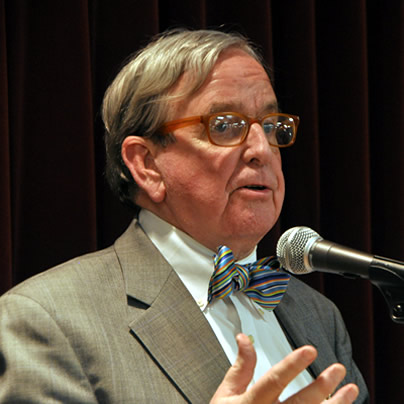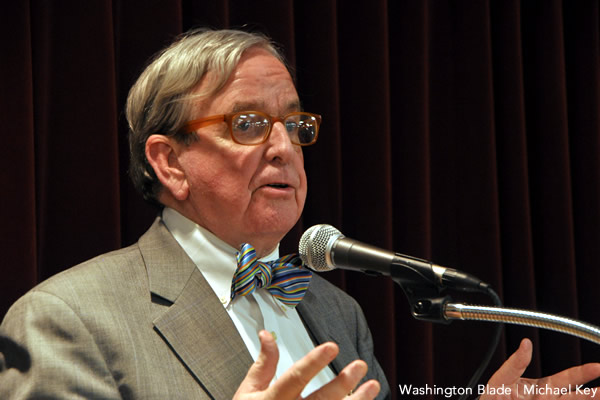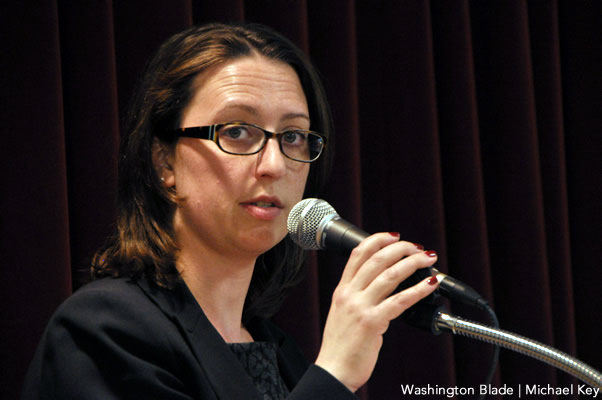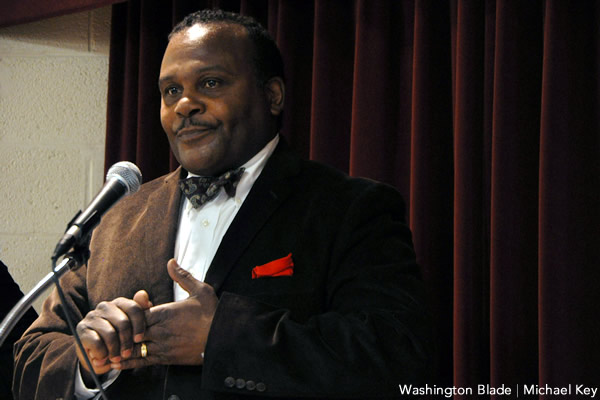Local
Stein Club unable to endorse in 3 Council races
Graham, Bonds finish second to challengers


Council member Jim Graham (D-Ward 1), a four-term incumbent, failed to secure a Stein Club endorsement Wednesday night. (Washington Blade photo by Michael Key)
The Gertrude Stein Democratic Club, the city’s largest LGBT political organization, was unable to make an endorsement in three of the five City Council races it considered Wednesday night when no candidate in three of the contests was able to capture a required 60 percent of the vote from more than 140 members in attendance.
D.C. Council Chair Phil Mendelson (D-At-Large), a longtime supporter of the LGBT community, easily won the club’s endorsement in his re-election bid after beating Democratic challenger Calvin Gurley by a vote of 120 to 13.
“I’m pleased and honored,” Mendelson told the Blade after the vote. “I’m very proud of my record on LGBT issues, not the least of which is marriage equality,” he said. “I’ve tried to be very supportive and I appreciate the support in return.”
Council member Kenyan McDuffie (D-Ward 5) also won the club’s endorsement by beating Democratic challenger Kathy Henderson by a vote of 124 to 13. A third candidate running in the April 1 Democratic primary for the Ward 5 Council seat, Carolyn Steptoe, didn’t attend the forum.

Brianne Nadeau (Washington Blade photo by Michael Key)
In a development that surprised some club members, challenger Brianne Nadeau finished ahead of gay Council member Jim Graham (D-Ward 1), a four-term incumbent, by a vote of 70 to 64, with one person voting for no endorsement. Although Nadeau’s supporters called the outcome a victory for her, the vote total came nowhere near the 60 percent threshold needed for an endorsement.
Graham’s supporters, including former Stein Club President Kurt Vorndran, said the close vote between Nadeau and Graham didn’t reflect the true sentiment of LGBT voters, whom they said would vote overwhelmingly for Graham in the April 1 primary.
Nadeau supporters dispute that assessment, saying the Ward 1 civic activist and former Advisory Neighborhood Commission member has emerged as Graham’s strongest challenger in years.
The voting took place after incumbents and challengers running for Council seats in Wards 1, 5 and 6; an at-large seat; and the position of Council Chair gave opening remarks and answered questions from the audience.
Many of the questions were about non-LGBT issues, highlighting what some Stein Club members said was the perception that LGBT issues may no longer be a key factor because nearly all candidates running for public office in D.C. support LGBT equality.
Close to 200 people attended what the Stein Club called a combined endorsement meeting and candidate forum, which was held at Unity of Washington Church at 1225 R St., N.W.
In yet another surprise to some of the attendees, challenger Nate Bennett-Fleming, who holds the position of shadow U.S. Representative, finished ahead of incumbent Council member Anita Bonds (D-At-Large) by a vote of 68 to 51 in a run-off ballot.
In the first ballot vote, Bennett-Fleming beat Bonds by a vote of 60 to 53. Challengers John Settles and Pedro Rubio came in third and fourth with 14 votes and 12 votes respectively.
In the Ward 6 race, Democratic activist Charles Allen, former chief of staff for Council member Tommy Wells (D-Ward 6), finished ahead of Darrel Thompson, a former chief of staff for U.S. Senate Majority Leader Harry Reid (D-Nev.), by a vote of 68 to 65. Both have expressed strong support for LGBT rights and have worked on LGBT issues in their previous jobs.
Similar to the Ward 1 and At-Large races, the vote spread between Allen and Thompson was too close to give Allen the 60 percent margin he needed for an endorsement.
“When you have these endorsement processes it’s about who can bring their people out and who can electrify their constituency – and I think everyone did that,” said Earl Fowlkes, a member of the Democratic National Committee from D.C. and Stein Club member who served as moderator at the forum.
“That’s why there were these close races,” he said. “The people that are involved believe their candidate is better and they came out on a cold winter night and stayed for two ballots.”
Fowlkes said the club shouldn’t be disappointed in the lack of endorsements in the three Council races because the division in the vote reflects the sentiment of the club’s members.

Calvin Gurley (Washington Blade photo by Michael Key)
All of the candidates speaking at the forum except Gurley, Mendelson’s challenger, expressed strong support for LGBT rights and promised, if elected, to be an advocate for the LGBT community.
Gurley, who received a “0” rating from the Gay and Lesbian Activists Alliance, spoke mostly about non-LGBT issues, saying he is committed to cleaning up corruption and waste in the city, which he said would benefit all residents, including LGBT people.
GLAA said it gave Gurley a 0 rating because he didn’t return the group’s questionnaire and it had no knowledge of his view on LGBT issues. At the forum, Gurley said he never received the questionnaire. GLAA President Rick Rosendall has said the group is meticulous in making sure that questionnaires are mailed or emailed to the addresses the candidates submit to the Board of Elections when they file papers to run.
During a period of discussion among club members following the forum, speakers appeared to be equally divided in their support between Graham and Nadeau.
Lesbian activist Barbara Helmick, a longtime Ward 1 resident, praised Graham for his long record of support on LGBT issues but said it was time for “new blood” on the Council.
“Let’s give the new gal a chance,” she said, in urging fellow club members to vote for Nadeau.
Patricia Hawkins, former deputy director of the Whitman-Walker Clinic, told of her work with Graham during the years he served as director of Whitman-Walker at the height of the AIDS epidemic and prior to his election on to the Council.
“He’s an important asset to our community and every community,” she said.
The Stein Club is scheduled to hold a similar endorsement meeting and candidate forum on March 6 for the eight Democratic candidates running for mayor, including Mayor Gray. The event is scheduled for 7 p.m. at the Metropolitan Community Church of Washington, 474 Ridge St., N.W.
District of Columbia
D.C. Black Pride theme, performers announced at ‘Speakeasy’
Durand Bernarr to headline 2026 programming

The Center for Black Equity held its 2026 DC Black Pride Theme Reveal event at Union Stage on Monday. The evening, a “Speakeasy Happy Hour,” was hosted by Anthony Oakes and featured performances by Lolita Leopard and Keith Angelo. The Center for Black Equity organizes DC Black Pride.
Kenya Hutton, Center for Black Equity president and CEO, spoke following the performances by Leopard and Angelo. Hutton announced this year’s theme for DC Black Pride: “New Black Renaissance.”
Performers for 2026 DC Black Pride were announced to be Bang Garcon, Be Steadwell, Jay Columbus, Bennu Byrd, Rue Pratt and Akeem Woods.
Singer-songwriter Durand Bernarr was announced as the headliner for the 2026 festivities. Bernerr gave brief remarks through a video played on the screen at the stage.
DC Black Pride is scheduled for May 22-25. For more information on DC Black Pride, visit dcblackpride.org.
Virginia
Arlington LGBTQ bar Freddie’s celebrates 25th anniversary
Owner asks public to support D.C.-area gay bars

An overflowing crowd turned out Sunday night, March 1, for the 25th anniversary celebration of Freddie’s Beach Bar, the LGBTQ bar and restaurant located in the Crystal City section of Arlington, Va.
The celebration began as longtime patrons sitting at tables and at the bar ordered drinks, snacks, and full meals as several of Freddie’s well-known drag queens performed on a decorated stage.
Roland Watkins, an official with Equality NoVa, an LGBTQ advocacy organization based in the Northern Virginia areas of Arlington, Alexandria, and Fairfax County, next told the gathering about the history of Freddie’s Beach Bar and the role he said that owner Freddie Lutz has played in broadening the bar’s role into a community gathering place.
“Twenty-five years ago, opening a gay bar in Arlington was not a given,” Watkins told the crowd from the stage. “It took courage, convincing, and a deep belief that our community belongs openly, visibly, and proudly,” he said. “And that belief came from Freddie.”
Watkins and others familiar with Freddie’s noted that under Lutz’s leadership and support from his staff, Freddie’s provided support and a gathering place for LGBTQ organizations and a place where Virginia elected officials, and candidates running for public office, came to express their support for the LGBTQ community.
“Over the past 25 years, Freddie’s has become more than a bar,” Watkins said. “It has become a community maker.”
Lutz, who spoke next, said he was moved by the outpouring of support from long-time customers. “Thank you all so much for coming tonight and thank you all so much for your support over the past 25 years,” he said. “I can’t tell you how much that means to me and how much it’s kept me going.”
But Lutz then said Freddie’s, like many other D.C. area gay bars, continues to face economic hard times that he said began during the COVID pandemic. He noted that fewer customers are coming to Freddie’s in recent years, with a significant drop in patronage for his once lucrative weekend buffet brunches.
“So, I don’t want to be the daddy downer on my 25-year anniversary,” he said. “But this was actually the worst year we’ve ever had,” he added. “And I guess what I’m asking is please help us out. Not just me, but all the gay bars in the area.” He added, “I’m reaching out and I’m appealing to you not to forget the gay bars.”
Lutz received loud, prolonged applause, with many customers hugging him as he walked off the stage.

In an official statement released at the reveal event Capital Pride Alliance described its just announced 2026 Pride theme of “Exist, Resist, Have the Audacity” as a “bold declaration affirming the presence, resilience, and courage of LGBTQ+ people around the world.”
The statement adds, “Grounded in the undeniable truth that our existence is not up for debate, this year’s theme calls on the community to live loudly and proudly, stand firm against injustice and erasure, and embody the collective strength that has always defined the LGBTQ+ community.”
In a reference to the impact of the hostile political climate, the statement says, “In a time when LGBTQ+ rights and history continue to face challenges, especially in our Nation’s Capital, where policy and public discourse shape the future of our country, together, we must ensure that our voices are visible, heard, and unapologetically centered.”
The statement also quotes Capital Pride Alliance CEO and President Ryan Bos’s message at the Reveal event: “This year’s theme is both a declaration and a demand,” Bos said. “Exist, Resist, Have Audacity! reflects the resilience of our community and our responsibility to protect the progress we’ve made. As we look toward our nation’s 250th anniversary, we affirm that LGBTQ+ people have always been and always will be part of the United States’s history, and we will continue shaping its future with strength and resolve,” he concluded.
-

 India5 days ago
India5 days agoActivists push for better counting of transgender Indians in 2026 Census
-

 Advice5 days ago
Advice5 days agoDry January has isolated me from my friends
-

 National5 days ago
National5 days agoAfter layoffs at Advocate, parent company acquires ‘Them’ from Conde Nast
-

 District of Columbia5 days ago
District of Columbia5 days agoCapital Pride reveals 2026 theme



















